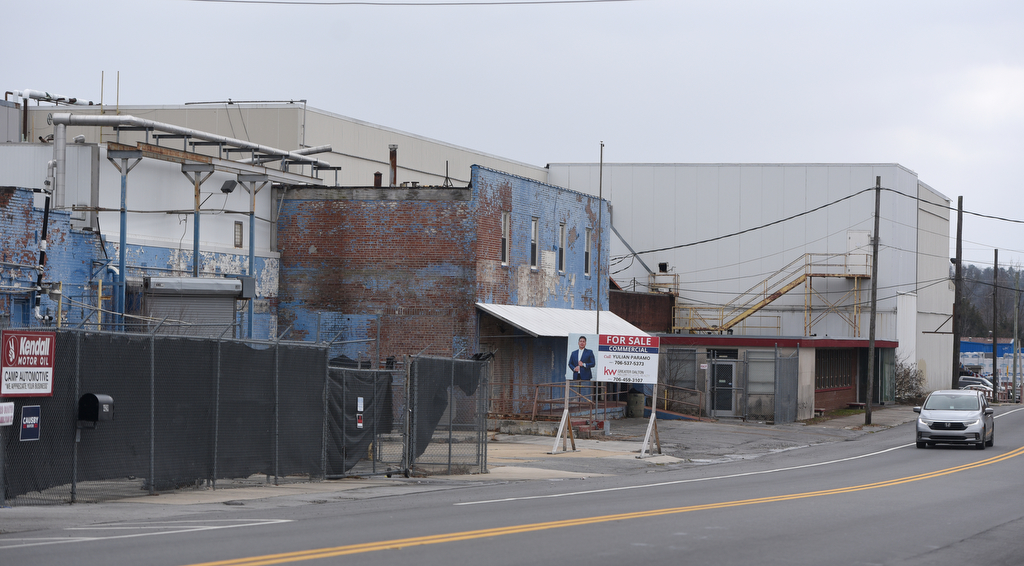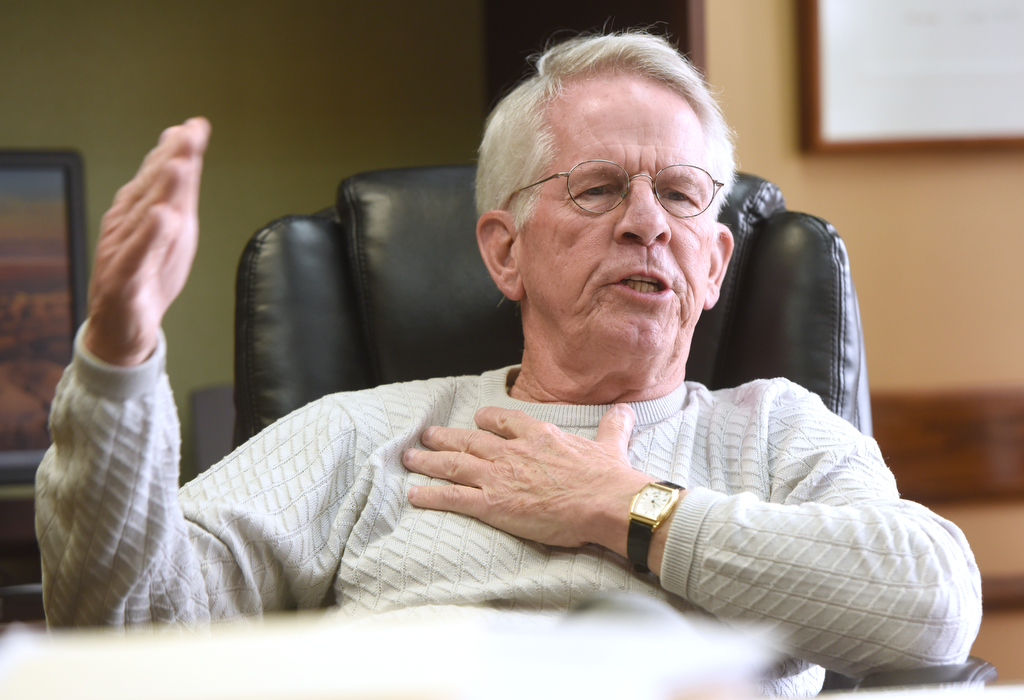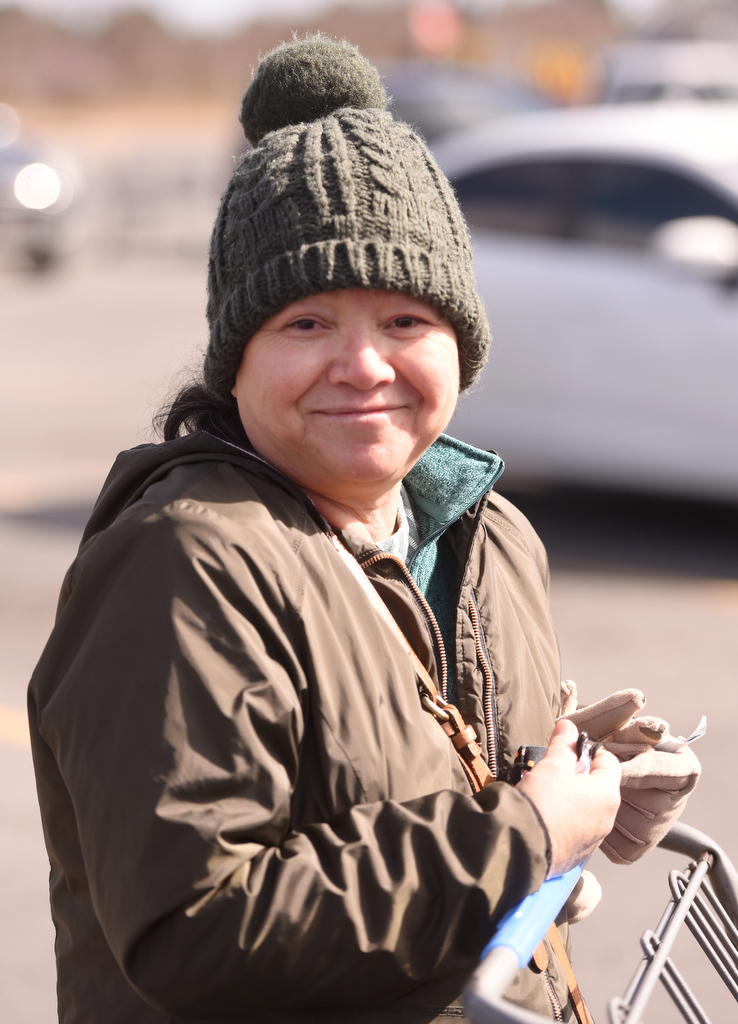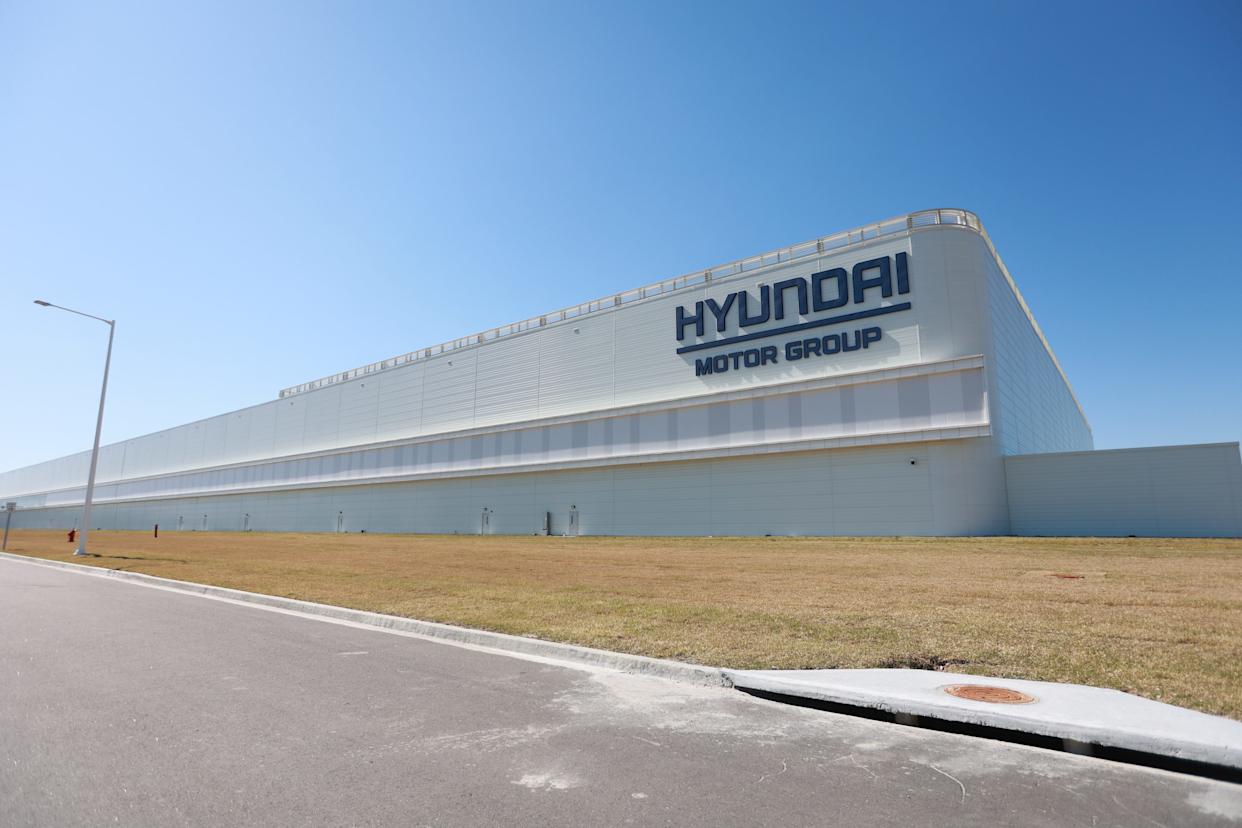DALTON — Dim lights flicked on overhead, revealing hundreds of door frames, packed sideways against one another like books on a shelf. In this frigid warehouse on the outskirts of town, Magdaleno Perez Alvarez snaked through the rows and the shadows, pointing out different kinds of doors — new doors, broken doors — alongside window frames and flooring materials and then, once he’d stepped outside into the whipping wind, an impressive collection of heavy machinery.
Was this all his too, a visitor asked.
“Todo lo que está aquí es mío,” he replied: Everything that is here is mine.
Recently sold to him, he said, as a way to help settle a debt, this nondescript warehouse across from a massive junkyard is the site of Alvarez’s latest endeavor in this North Georgia town, which has been transformed in recent decades by thousands of entrepreneurial immigrants like himself.
Many of them also share his peculiar situation. As when, he said, in the 1970s he first crossed into the U.S. near Ciudad Juárez and found work on a Colorado cattle ranch, Alvarez has no legal basis for being in the United States.
Economic imperatives — for him, for those he worked for — have long sidelined this fact. Yet it’s a persistent one. It means he has no legal way to get a driver’s license, no access to most public benefits and now a heightened possibility of being caught up in an immigration law enforcement apparatus which is under tremendous pressure to make good on President Donald Trump’s central campaign promise of mass deportations.
In Dalton and beyond, the promise remains just that. In recent weeks, community members and leaders say, there have been no conspicuous immigration enforcement efforts in town. Yet there are signs that even long-time residents could be detained — and a sense that more is to come.
Many are hiding out, avoiding work and errands and night life, according to several Daltonians, including Alvarez, who said he knows people who are homebound, sidelined from work and fretting over rent and bills.
Not him, though. After years of hustle, he said he has paid off his home, which is now worth many times what he bought it for decades ago. Were he to get deported, he said, his citizen children here — among the dozens of family members who live in the area — could help handle his affairs, sell off his possessions. The windfall from these years of labor, he speculated, could sustain him anywhere.
But where? Alvarez first arrived in the U.S. at a time when most of today’s Americans were not yet alive. His ties to his birthplace have faded. Even his mother long ago left Mexico for Dalton, he said. She died in Dalton, was buried in Dalton.
“I have nothing to go to Mexico for,” Alvarez said. “I have no family, I have nothing there now.”
Staff photo by Matt Hamilton/ Magdaleno Perez Alvarez speaks during an interview at his business in Dalton on Thursday, February 20, 2025.
‘THEY’RE COMING’
Since he leapt from reality TV to the national political stage, Trump has built his political movement while arguing that immigrants tend to be rapists and criminals, “poisoning the blood” of the country.
Dalton, a youthful town of 34,000 people, more than half of whom are Hispanic and roughly 3 in 10 of whom are immigrants — many of them here illegally — might seem a ripe location for his administration to carry his pledge to arrest and deport unauthorized immigrants en masse.
So far, however, enthusiasm in Dalton for such an effort seems muted, and what enforcement efforts there have been appear to have taken place in denser realms of the country.
“They mostly have been in Atlanta, sanctuary cities,” America Gruner said in a recent interview. “But we know they’re coming here next.”
Gruner herself came to Dalton in 2002. She had immigrated to California previously but, considering her young daughter’s future, grew disturbed by violence and drugs in the area. After returning to Mexico, she said, she heard of a need for bilingual staff in Dalton Public Schools and set off again.
Within a few years, she founded the Coalition of Latino Leaders to fight for the interests of an immigrant population that, in a remarkable rush that took off in the 1990s, had become a cornerstone of Dalton’s manufacturing-based economy and an increasingly vital part of its cultural life.
The other day, Gruner was seated in a fluorescent-lit conference room, part of the nonprofit’s new office in an area of East Dalton.
Of late, she said, the organization’s know-your-rights seminars have been packed, its Facebook page has received violent threats and the group has been fielding numerous calls from immigrants seeking consultations with lawyers.
Gruner estimates some 30-40% of Dalton-area Latinos are undocumented, a group that spans all ages. Most, unlike Alvarez, are very worried, she said, Many have been holed up, reluctant to so much as go out and buy groceries, as kids go to school fearing parents might not be there when they return.
 Staff photo by Matt Hamilton/ A closed chicken processing plant in Dalton is seen on Thursday, February 20, 2025.
Staff photo by Matt Hamilton/ A closed chicken processing plant in Dalton is seen on Thursday, February 20, 2025.
She said a former volunteer who’d lived in town for decades has been arrested for alleged speeding and transferred to Stuart Detention Center, the privately run South Georgia facility operated under a contract with U.S. Immigration and Customs Enforcement. The episode, and others like it, have underscored the real possibility that even longtime residents could be caught in an immigration crackdown.
It’s not the first time the deportation threat has loomed large in Dalton, though like many, Gruner thought back not to the first Trump administration, but earlier.
“When the roadblocks were very frequent, it was similar,” she said, recalling a period under then-President Barack Obama, when local law enforcement stopped traffic to check cars, a practice she said resulted in hundreds of deportations. “But this time it’s kind of a spectacle, like a show.”
‘SEE IT IN DALTON’
Immigrants are often depicted in grim terms — the sad, victimized uprooted migrant on one side, or from the other, a malevolent violent type who has contributed to somebody else’s economic dislocation.
As he prepared for an interview for this story, University of California Los Angeles sociologist Rubén Hernández-León, who has for decades been studying U.S.-Mexico migration — and in particular one of its famous case studies, Dalton — said he found himself thinking instead about the concept of joy.
“You can see it in Dalton,” he said in a video call, describing the sense of entrepreneurial drive, the town’s four-year college, a renowned soccer culture, a rich culinary and musical scene, the emergence of “intrinsically interesting” new relationships and fusions.
It is sometimes forgotten, he said, that migration streams are highly selective for people in good health, who are driven and capable of withstanding risks and challenges. And he said this shows in the spirit of places that have been remade in the image of newer arrivals.
Still, the fact that immigration involves trade-offs is well known. This is one reason the basic history of migration in Dalton has long been litigated — at times literally in the courts, where some in the past have accused Dalton’s carpet manufacturing industry of having recruited immigrants in an effort to suppress domestic wages.
Industry leaders and allies have generally denied this charge. Hernández-León said he is not aware of evidence that carpet manufacturers actively recruited immigrants, but it’s certainly the case that poultry companies throughout the South put ads in newspapers, flyers and billboards along the border and beyond. He recalled himself hearing ads on Latino radio stations in Los Angeles, beckoning people to factories out East, promising good jobs and help with relocation.
Whatever its origins, few dispute that mass migration to places like Dalton was driven primarily by word-of-mouth rumors, which employers often egged on, of an excellent labor market for migrants. From the seasonal agriculture circuit of the U.S. Eastern Seaboard to the highlands of Central Mexico, word spread of abundant work in Dalton.
There were some early signs of the massive change to come. David Boyle, one of the few bilingual people in town in those early days, remembers getting called to assist a nurse treating a pregnant woman who spoke no English.
David Pennington, a two-time mayor and third generation Daltonian, recalled looking out the window from his insurance office during this period and noticing more and more Latino people walking to work at the Conagra poultry plant downtown.
 Staff photo by Matt Hamilton/ Former Dalton Mayor David Pennington speaks during an interview in his office in Dalton on Thursday, February 20, 2025.
Staff photo by Matt Hamilton/ Former Dalton Mayor David Pennington speaks during an interview in his office in Dalton on Thursday, February 20, 2025.
The first arrivals knew they stood out. Roy Alvarran, who settled in Dalton as a child in the 1980s after moving around the country with his parents (who’d met doing agriculture work in Florida), remembered being one of perhaps 10 Hispanic students in school when he was young.
By the time he got to Dalton High School, the town was changing fast. Word was getting out that the carpet mills, which turned out to offer even better jobs than the poultry factories, needed entry-level carpet creelers and hyster drivers — and lots of ’em.
“You could go to one job, and if you didn’t like that job, you could walk out and you could go to the next building right beside you and get a job,” he said. “You could work 60 hours in a plant and get paid good, and not have to endure the extreme temperatures, and the instability of going from one town to the next.”
A young Alvarran worked the mills himself. He recalled making $7.25 an hour, which would be worth about twice as much today. He was a U.S. citizen, but many of the workers didn’t have work authorization — an inconvenient truth easily steamrolled by the economic imperative to keep the machines churning day and night.
A wave of immigration enforcement raids in the late 1990s disrupted the dynamic, at least a bit. Alvarran said he personally knew several people who were deported at the time.
But then again, he added, many of them were back in Dalton within the month.
A NEW COMMUNITY
In his insurance office the other day, with flurries blowing outside and cozy green carpeting underfoot, Pennington, whose second mayoral term ended last year, reflected on the town’s economic history.
The labor need stemmed in part from broader economic development in the region, he said. Where a worker might have in the past commuted from, say, Cleveland, Tennessee, by the 1980s such towns could offer residents jobs closer to home.
In his eyes, this fact, combined with declining birth rates, meant new immigrants were the only way to sustain and grow the local economy. Asked about any backlash, Pennington said at times he used his pulpit as mayor to calm anger, but that most people saw the immigration as necessary.
“We’re a pretty open town for a Southern town,” he said.
Before long, he and others said, it became clear that for many immigrants, Dalton was not just a pass-through town, but a place to put down roots.
“They tend to settle in East Dalton as a community,” said Boyle, who in the early 2000s founded a bilingual social work program at Dalton State University. “And then the little businesses start popping up. The barber shops, the beauty shops, the carnicerías, the little grocery stores, the bakeries. All those things start showing up. And one thing about Mexicans in general, they are entrepreneurs. They can start a little business in a corner and keep working at it and, before you know, it’s a growing business.”
In time, some of the new arrivals came from more professional backgrounds, like medicine and law. A new community was being born.
Fast forward 20 years, and today the schools are largely Hispanic. Many churches are largely Hispanic. The Whitfield County GOP has been affected too.
Reached by phone, its vice chair, Rod Miller, said Republicans in recent years have recently found their Hispanic friends and neighbors to be more conservative than many other Americans. He described his organization’s strengthened outreach efforts in recent years to Latinos, many of whom, he pointed out, favor stricter immigration enforcement themselves.
Whitfield County tends to vote overwhelmingly Republican, but Miller said the party is itself in many ways divided on the immigration question.
“I think if you went to the chamber of commerce, you’d see a lot of country club Republicans who don’t want immigration enforcement, because they’re making money off it,” he said.
Still, he said, most in the party do favor increased immigration enforcement, so long as it targets only those who are in the country without authorization.
He rejects the narrative that conservatives are not compassionate on the matter. While he said legal immigration has been a force for good, he believes illegal immigrants tend to strain school and health systems and should not be rewarded for cutting ahead of people seeking to enter the country through legal means.
RIGHT FROM WRONG
Neighborly affection toward immigrants is not uncommon in Dalton, a set of ad hoc interviews around town last week suggested.
“They’re all good people,” Alan Cloer said of his experience with immigrant neighbors. “We’re all immigrants. The Indian was here way before we were.”
Another woman, Hilda Molina, who said she immigrated to the U.S. decades ago from El Salvador, said she joined family in Dalton not long ago because Virginia was getting too liberal. She said she knew many immigrants in town were here illegally but sensed that most were just trying to provide for family.
“If they don’t do anything bad, no stupid things, they’re just working, I think they should leave them alone,” she said.
 Staff photo by Matt Hamilton/ Hilda Molina smiles in a Walmart parking lot in Dalton on Thursday, February 20, 2025.
Staff photo by Matt Hamilton/ Hilda Molina smiles in a Walmart parking lot in Dalton on Thursday, February 20, 2025.
Meanwhile, business continues to roll. Nancy Hernandez, behind the cash register at her grocery store, Super D Market, said she dreamed it up to have everything in one place: bakery, restaurant, store. A few feet away, a power drill whined. In a few weeks, the tortilla-making zone — for corn and flour varieties both — is set to launch.
The looming enforcement threat has met with some public opposition. In a phone interview, Antonio Martinez said he was drawn to a recent protest downtown because he wanted to promote a message that the anti-immigrant political climate was not benefiting the Dalton community and instead was instilling fear and keeping people from enjoying life. (He’d been invited to play the event with his band, Los Tres Sextos, but a member came down sick.)
Though Martinez was U.S. born and grew up in Dalton, he’s felt a hostile climate firsthand. Just recently, he said in a phone interview, he was out doing some work on the North Carolina coast when snow began to fall on the beach. He and his workmate went out to watch. Then he said, a family walked by, kids and their parents, and he heard it: The dad yelled “deportation!”
Martinez said he looked at his coworker, wondering if they heard the father correctly. In retrospect, he said, he figured the guy was dealing with some stuff inside of him.
“At the end of the day,” Martinez said, “we know what’s right from wrong.”
‘PUT YOUR MIND TO IT’
Today, Alvarran’s children are off to college — and he, like Pennington, is in the insurance business. Recently, he was helping Alvarez get some affairs in order regarding the new door and window business.
“Since I’ve never done this here, I wanted someone to tell me how to do it,” Alvarez said, referring to paperwork and tax matters.
He said it is not his first proper business in the U.S. Back in Kansas, where he moved after his ranch stint in Colorado, he grew tired of his bakery job and decided to start a little Mexican restaurant. When that went well, he said, he made bigger one: “Garcia’s Restaurant and Club.”
“If you put your mind to it,” he said, “any type of business will succeed.”
It closed when he moved to Dalton, which he found in the 1990s to be a place on the make, in contrast to his vision from a previous visit.
He said he briefly did the carpet industry thing, and found other work easy to come by too. Oscillating between Spanish and a swaggering English, he remembered the boss telling him, “Hey, if you know how to do the job, just prove it. There are furnaces, refrigerator, air conditioning. You fix this, and you got yourself a job.”
After mechanic work on RVs, he was off to Dalton Utilities, welding gas pipelines. And then on to the next thing.
“We Mexicans do work that no one else does,” he said “The papers aren’t what does the work. The person does. I do work that others don’t. I’m an electrician, plumber, mechanic, and I do all kinds of business. I don’t need to have any kind of paper. What I need is money! Money makes money, correct?”
Indeed, with his money he built a house, which is now worth yet more money. He got some cows, a throwback to his youthful days on a Zacatecas ranch. And he also built a family. He described his children, mentioning for example, a daughter who teaches in the same Dalton school she attended in her youth.
She’s also helping him establish for his business a name. And as for the competition — like Lowe’s, for example — he said he is not concerned.
“I know that they are big competitors, but I have a much better price,” he said. “That’s the difference.”
Indeed, he said he’d already found an eager customer base. They don’t come when it’s cold out, he said. But on warmer days not long ago, he said buyers came from Alabama, Chattanooga, purchasing 28 doors here, 16 windows there.
And even in frigid periods like this one, he still has plenty to do. He’s spent the time seeking out new inventory, fixing broken frames. Just the other day, he said, a few new truckloads came in. He has all types of doors now, he said, any size one might need, a truly mighty inventory. Springtime approaches. He wants to be ready to make some deals.
Contact Andrew Schwartz at aschwartz@timesfreepress.com or 423-757-6431.
Note: This story was updated Feb. 26 to correct the number of generations that former Dalton Mayor David Pennington’s family has lived in the city.







